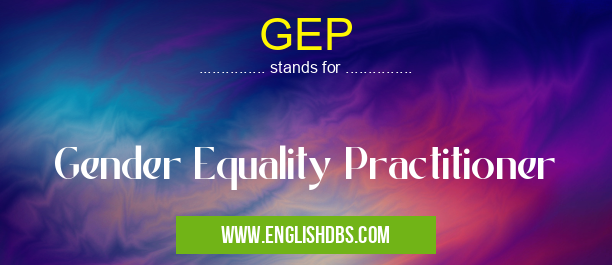What does GEP mean in UNCLASSIFIED
GEP stands for Gender Equality Practitioner. It is a professional designation for individuals who have demonstrated expertise in promoting gender equality and advancing the rights of women and girls.

GEP meaning in Unclassified in Miscellaneous
GEP mostly used in an acronym Unclassified in Category Miscellaneous that means Gender Equality Practitioner
Shorthand: GEP,
Full Form: Gender Equality Practitioner
For more information of "Gender Equality Practitioner", see the section below.
What does GEP mean?
GEPs are responsible for implementing and managing gender equality initiatives within organizations, communities, and governments. They work to create a more just and equitable society for all, regardless of gender.
GEP Meaning in MISCELLANEOUS
In the context of MISCELLANEOUS, GEP refers to the field of gender equality and the role of practitioners in promoting it. GEPs play a crucial role in:
- Policy development: Advising on and developing policies and programs that promote gender equality.
- Research and evaluation: Conducting research and evaluating the effectiveness of gender equality initiatives.
- Capacity building: Training and empowering individuals and organizations to implement gender equality measures.
- Advocacy and awareness-raising: Raising awareness about gender inequality and advocating for change.
GEP Full Form
The full form of GEP is Gender Equality Practitioner.
Essential Questions and Answers on Gender Equality Practitioner in "MISCELLANEOUS»UNFILED"
What is a Gender Equality Practitioner (GEP)?
A Gender Equality Practitioner (GEP) is an individual who has specialized knowledge, skills, and experience in promoting gender equality and women's empowerment. GEPs work in a variety of settings, including government, non-profit organizations, and international development agencies. They may also work as consultants or independent contractors.
What are the primary roles and responsibilities of a GEP?
The primary roles and responsibilities of a GEP typically include:
- Conducting gender analyses and assessments
- Developing and implementing gender equality policies and programs
- Providing training and capacity building on gender equality
- Monitoring and evaluating gender equality initiatives
- Advocating for gender equality at local, national, and international levels.
What qualifications and experience are typically required to become a GEP?
GEPs typically have a master's degree or higher in a field related to gender equality, such as women's studies, gender studies, or public policy. They also typically have several years of experience working in the field of gender equality.
What are some of the challenges and complexities of working as a GEP?
Some of the challenges and complexities of working as a GEP include:
- The need to navigate complex political and cultural contexts
- The need to work with multiple stakeholders with diverse perspectives
- The need to maintain a commitment to gender equality while also being realistic about the challenges involved in achieving it.
Final Words: GEPs are essential to the achievement of gender equality and the empowerment of women and girls. Their expertise and dedication help to create a more just and equitable world.
GEP also stands for: |
|
| All stands for GEP |
